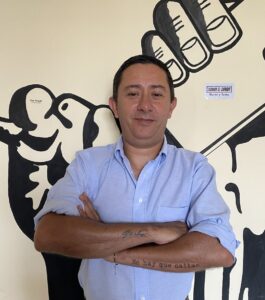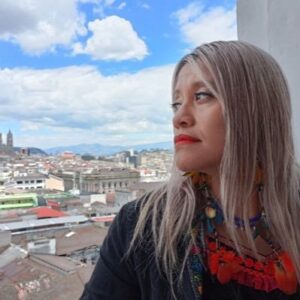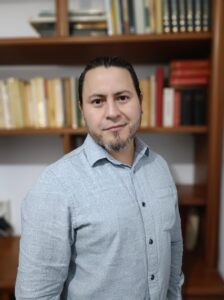Uncertainty, that is the word Guatemalan journalists Marvin Del Cid, Lucia Ixchíu and Gerson Ortiz use to describe their lives in exile.
According to the Association of Journalists of Guatemala (APG), around 25 journalists from that country have had to go into exile due to censorship, attacks and persecutions that have worsened in the last 10 years.
In Guatemala, journalism is consistently criminalized and punished.
In 2023, two journalists were murdered and the cases still remain unpunished. APG’s observatory recorded 171 attacks or limitations of the press that year.
In 2022, José Rubén Zamora, president and founder of the well-known newspaper elPeriódico, was accused of money laundering, influence peddling and blackmail. Although his sentence was annulled, he is still in prison, and elPeriódico was forced to close in 2023.
Following repression of the press during the administration of President Alejandro Giammattei, in January of this year, Bernardo Arévalo assumed the presidency of Guatemala. In a meeting with journalistic organizations, the new president stated that his government "is not going to use tools to judicially persecute the press." In addition, he added that "freedom of expression is a priority on the national government's agenda."
“The change [of government] is too recent to know what will happen to the situation of [Guatemalan] journalists in exile. Arevalo committed to testing a protection mechanism for journalists and that may lead to some changes for those who are working in Guatemala. But, I don't know whether to expect a massive return of journalists from exile. I think it will take time,” Ortiz told LatAm Journalism Review (LJR).
Below we present the stories of Del Cid, Ixchíu and Ortiz, who told LJR what their life is like after going into exile and what they hope for the future of journalism in Guatemala.

“You don't know if you're going to come back and tomorrow you'll have to go out again... Putting your life in three suitcases is not easy, sometimes there are difficult moments,”, Guatemalan investigative journalist Marvin Del Cid said. (Photo: Courtesy).
Guatemalan investigative journalist Marvin Del Cid has had to leave his country on several occasions because of risks to his safety.
In 2021, he was criminally sued due to the publication of two journalistic investigations in the media outlet Vox Populi, of which he is cofounder. Vox Populi is a project of the press freedom association Article 35.
Del Cid along with journalist Sonny Figueroa were denounced under laws related to coercion and violence against women following publication of a report on the luxury properties that relatives of the former director of the Government Center, Luis Miguel Martínez Morales, have occupied.
They were also denounced for alleged psychological violence by the Director of Communication of the Congress of the Republic, Joselyn Fernanda Mérida Solano, after a report implicated her in a smear campaign against the work of the Human Rights Ombudsman, Jordán Rodas.
On other occasions, Del Cid has had to leave Guatemala, as he explains to LJR, due to threats on social networks and fear of surveillance by the State. At the moment, he is living in Costa Rica with the support of an academic program.
“You don't know if you're going to come back and tomorrow you'll have to go out again. My plan was not to come here [Costa Rica], I arrived by coincidences in life. Putting your life in three suitcases is not easy, sometimes there are difficult moments,” Del Cid said.
At the end of last year, Del Cid and Figueroa reported that they, along with other journalists, were allegedly classified as a “threat to the security of the State” in a leak of documents from the Guatemalan Ministry of Defense.
“This shows that the State itself plans the persecution against journalists. I think it is a very serious and delicate case. That the State of Guatemala, through the Army, considers journalists a threat to national security, puts us at the level of terrorist or drug trafficking groups. I feel that international organizations have not given this issue enough seriousness,” Del Cid said.
The Ministry of Defense spoke out denying the accusations and stating that the institution “sees all media as important allies for the Army's strategic communication purposes, without any bias.”
According to Del Cid, their journalistic dynamics both at Vox Populi and Article 35 have changed a lot with exile. They can no longer conduct certain interviews or visit public archives and they depend on collaborators on the ground.
On an emotional level the consequences are more difficult to overcome.
“No one plans to leave their country like this. In addition, there is always that uncertainty of not knowing if I will be able to return at some point,” he said.

“As long as the prosecutor is there, the cases of criminalization, persecution and violence that have occurred against us [journalists] will not end,” journalist Lucia Ixchíu said. (Photo: Courtesy).
Lucia Ixchíu was born in Totonicapán, Guatemala and is a K'iche Indigenous person, journalist and artist. Although she studied architecture at the University of San Carlos in Guatemala, she became interested in the area of communication in 2012 when there was a massacre in her hometown. She said it changed her life and that of her family.
“I decided to start telling my own story that is also the story of our people… I began to communicate from Indigenous and community perspectives and through a collective I became a digital loudspeaker,” Ixchíu told LJR.
After this event, in which seven people lost their lives while demonstrating against the increase in electric power and in defense of the right to education, Festivales Solidarios was born. It’s a media outlet made up of artists, communicators and journalists that describes itself as “anticolonial.”
“We began to do strategic communication, making visible extractivism, the climate destruction of the extractive industry of mining and monoculture, and the criminalization of land defenders,” Ixchíu said.
In 2020, in the midst of the COVID-19 pandemic, Ixchíu was attacked along with her sister Andrea Ixchíu while they were documenting the illegal logging of the Totonicapán Community Forest, about 111 miles west of Guatemala City.
After this incident, according to Ixchíu, there was an escalation of violence, aggression and hate and defamation campaigns that led her to leave the country.
“I refused to leave at first, for various reasons. But, in the end, there was a campaign on social networks where they said that one of my relatives was going to appear dead. So, many people already told me: 'Look, Lucia, the level of violence has already escalated to exorbitant levels.' So I had to leave the country, with no other alternative,” the journalist said.
For Ixchíu, exile has been a hard process on emotional and economic levels. Both the journalist and her partner Carlos Ernesto Cano, a Guatemalan community documentary filmmaker, are in Spain as asylum seekers.
“There has been a precarization of our lives and I think it is important to make it visible. No one is interested in giving resources, funds or scholarships to someone in exile. In other words, either there are very few or everything is temporary. I have been in exile for almost three years now and it is very difficult because there is no real reintegration from the governments so that we can practice or work in our profession,” she explained. “I have tried to do a lot of therapy and a lot of personal work, but particularly right now I am going through a very difficult situation.”
Ixchíu wants to return to Guatemala but expresses that she sees no possibilities as long as the current Attorney General, María Consuelo Porras, remains in her position. The journalist said she has some open court cases in the country in which she is accused of attacking soldiers and civilians during protests. She says these are false accusations.
“As long as the prosecutor is there, the cases of criminalization, persecution and violence that have occurred against us [journalists] will not end,” she said.

“The change [of government] is too recent to know what will happen to the situation of [Guatemalan] journalists in exile... I don't know whether to expect a massive return of journalists from exile. I think it will take time,” journalist Gerson Ortiz said. (Photo: Courtesy).
Before going into exile, Gerson Ortiz worked at elPeriódico, a Guatemalan media outlet founded by José Rubén Zamora that closed in May 2023 after almost 27 years after it was created.
“A year ago, the Guatemalan Prosecutor's Office requested to open an investigation against some journalists who work at elPeriódico. This as a parallel criminal case against José Rubén Zamora...what the Prosecutor's Office argues is that José Rubén and we, through elPeriódico, intimidated (of course it is false) judicial operators. Then they accuse us of obstruction of justice,” Ortiz told LJR.
Along with Ortiz, the Prosecutor's Office was also approved to investigate columnists Edgar Gutiérrez and Gonzalo Marroquin Godoy, in addition to the director of elPeriódico Julia Corado, and the journalists Alexander Valdez, Cristian Velix, Rony Ríos and Denis Aguilar.
Due to this complaint, Ortiz said human rights organizations contacted him to warn of the high risk of imprisonment he faced.
“The reason for my departure from the country is the case that the Prosecutor's Office opened against me for the crime of obstruction of justice, a crime that is in Guatemalan regulations in order to prosecute organized crime. That is to say, for the Prosecutor's Office, we the elPeriódico journalists were part of organized crime,” he explained.
However, Ortiz does not have any arrest warrant against him although he said he had been unofficially informed that this would be the case.
“We knew that they were going to request them [the arrest warrants] and that is also why I left the country, but the Prosecutor's Office never requested them. We believe it is because they really had no evidence against us,” he said.
Ortiz said that after 17 years of experience as a journalist, his work dynamic has changed. Exile, in his words, has created a distance from the reality of the country that he can later see reflected in the text. Furthermore, he feels that on an emotional level his departure has taken its toll on him.
“I have had moments of great uncertainty that have a very harmful effect on mental health. That uncertainty of not knowing what to do and not knowing what your next step may be,” he said.
The future of journalism in Guatemala
The future of journalism in Guatemala is uncertain. Collectives of journalists in that country have created campaigns that seek to raise awareness among the population about the importance of the profession for society and for democracy. However, it is still too early to know the results of that effort.
For Ixchíu, the future of journalism is Indigenous and belongs to women.
“The topic of radio, podcasts and work from Indigenous voices is something that has grown a lot in recent years. When I started in 2012, there were very few Indigenous women who were in communication or were visible; It was very difficult for us to be recognized. Now I see with great emotion many young Indigenous girls doing communication in Guatemala,” she said.
Del Cid trusts in the power of Guatemalan journalism, but is concerned about growing disinformation on social networks.
“I think this is the time when more investigative journalism needs to be done. We have a great commitment to present verified and supported information,” he explained. “Everything we have published is backed up, endorsed and contrasted, but there are powerful groups now that blur the information so that reports that are serious lose impact,” he added.
Ortiz said that the audience is not as connected to journalism as before.
“In the specific case of elPeriódico. Yes, there was intrinsic and very strong support from the public. They even organized demonstrations to support José Rubén. But, that does not happen with all media,” Ortiz said. “I feel that people in Guatemala are a little disconnected from the media. There is no such view that the media are important for a democracy. That vision has not been built.”